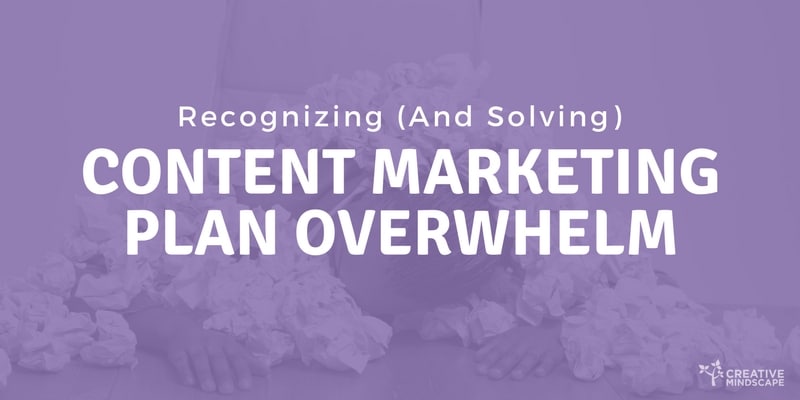You might be in over your head with your content marketing plan if every time you go to act on it you freeze. One common mistake people make when coming up with content marketing plans is being overly-ambitious, particularly when they are just starting out.
Think of your content marketing strategy as an athlete thinks of a marathon (or ultra-marathon): If you start out too hard and too fast, you’re going to get an injury, and you won’t be able to complete the race.
If you start out with a content plan that is overwhelming, you’re unlikely to meet your goals – much less your milestones. Here’s how to recognize if you’re being too ambitious with your plan and how to correct the problem.
You’re Calling For Fresh Long-Form Content Every Day
While many people (mistakenly) believe that everyday posting is necessary for content success, consistent posting is more important than frequency of posting. This is particularly true when you’re getting started with content marketing and blogging.
Everyday posting out the gate, unless your firm is able to afford a dedicated content marketing expert from the outset, is unrealistic. While you may start out strong, life, a surge in business, new product or service development, or necessary business operations (taxes) may get in the way of that daily post. This can then lead to sporadic posting.
Instead, take a moment and be realistic about what your company can commit to on a regular, consistent basis. That may mean that you commit to two posts a month or one post a week. It’s better to start out slower and then add more frequent posts as you are able (or as you can write ahead) than it is to have your company’s blog sitting empty after having posts every day for a month and a half.
You’re Trying To Stay On Top Of Too Many Platforms
Social media helps get the word out about your business. There are a lot of platforms, and it’s tempting to join them all and ambitious to strive for daily updates on all of them. Like your long-form content, this can go south quickly.
Imagine for a moment that you run a very successful content and social media campaign, and suddenly, your company is flush with customers. Suddenly, you no longer have time to update Facebook, Twitter, LinkedIn, StumbleUpon, Tumbler, Pinterest, Instagram, Snapchat, Google Plus, YouTube, Reddit, and Vine every day – and forget about some of the smaller networks you belong to.
I’ll let you in on a little secret – on Twitter, unless the person is an influencer or someone I’ve regularly interacted with, if that person goes silent for three months or more, I unfollow him or her.
What’s better than trying to stay on top of every social media platform? In your market research, figure out where your audience is hanging out. Choose one or two of those platforms to start with, build your following on there.
When it’s clear that you can keep up with regular posting and interactions, then consider adding additional platforms. Once again, it’s much better to start small than it is to go big and burn out quick.
You Stare At Your Screen For Hours Before Writing A Word
Sometimes, instead of being ambitious with visibility or the frequency of posting, a content marketing plan may be ambitious about the topics you plan to cover. Some topics are reaches, some topics are boring, some topics are not really relevant to your business.
If you regularly find yourself staring at a blank screen, it may be due to the fact that you’re either casting your net too wide or that you’re trying to cover topics you’re not familiar enough with to write well about.
That’s okay! It is okay to decide that a topic you thought was right for your blog actually doesn’t belong on there. It’s also possible that you’re writing too often and that your company doesn’t have enough topics to cover the frequency of posting.
It’s much better to write about what you know and in a way that demonstrates your company’s niche than it is to write the Great Viral Post. Think about how you can add value to your audience’s experience. Each post on your website should share information about what your company does, demonstrate expertise, add to your target market’s knowledge base, or respond to customer feedback or new information in your field.
You Don’t Know What To Do Next
I know I was guilty of this when I was starting out a decade ago. I’d write a brilliant plan for how I would do some amazing and great thing – and then I would not know what steps to take to make that plan happen.
When creating content marketing plans, it’s really easy to become results-focused. After all, we all want to have a bunch of readers and we want lots of people sharing what we post – and most importantly, we want those contracts signed.
The problem was, I didn’t focus on creating actionable steps to get me to those fabulous results. The biggest problem with creating results-oriented plans is that they often lack the attention to actionable items that are necessary to actually execute the plan.
If you find yourself sitting there thinking “Okay, great! My plan is done! Now what?” Then you haven’t broken your plan down into actionable steps. When you finish writing your marketing plan, the first step, as well as the thirtieth, should be well-defined, otherwise, you’ve just made a brilliant goals document but not really a plan.
You Treat The Plan As Though It Is Set In Stone
If something’s not working, but you’re sitting there doing the same thing over and over again because it’s in the plan, you may be treating your plan is immutable. This isn’t the case!
The wonderful thing about marketing plans (and blogging plans, and business plans) is that we can change them when we find that something doesn’t work.
Not every strategy is going to work for every company. You may find that a twice-weekly posting schedule is better than your three-times a week posting schedule you started with or vice-versa. You may find that your posts to Google Plus are made to an empty room or that StumbleUpon really isn’t applicable to your company. That’s okay!
One mistake that we make is feeling like making mistakes or decisions that end up not working out means that we’re somehow incompetent. If instead, you see such experiences as learning opportunities – or even experiments that did not confirm our hypothesis – then it’s easier to go back to your plan and change things so that you can better respond to the feedback you’re getting.
Everything Falls Apart When Life Happens Or Business Booms
One more big area where people find themselves in over their heads is when someone gets sick or the marketing efforts were so effective as to make it impossible to keep up with the original plan for marketing. This is when you see a successful business suddenly fall off the social media radar.
Don’t be that business! Have a backup plan. One thing you can do is have extra blog posts in reserve for times when no one is able to post. That way, it’s easy to schedule the post in reserve and get it up on the site. Scheduling tools like Hootsuite and Buffer are great back-ups for getting fresh social media posts out (though you should make some time each day to hop on and interact with a few people).
Another option for when things become unmanageable even with your best efforts to maintain a conservative and consistent content marketing plan is to outsource your content creation and social media management to an agency or a consultant. This can be especially beneficial for smaller companies that don’t have a budget for a marketing team.
Regardless of what your solution is, it’s important to ensure that the content will still go on as scheduled – even when things become chaotic. It’s also beneficial to ensure that there is a backup person who can edit and schedule posts in the absence of the individual normally responsible for it.
Have you ever been overwhelmed by your content marketing plan? Share your experience – and your solution – in the comments.
Ronda Bowen is VP of Editorial Services at Creative Mindscape. She also provides editorial consulting services to a variety of businesses and individuals, runs a handful of blogs (including WiningWife®), and serves as Fundraising Director for JB Dondolo, Inc. In her downtime, she’s a distance runner, a foodie, a wine and coffee aficionado, seamstress and crafter, and board game enthusiast. Learn more about Ronda’s various projects on her website.




